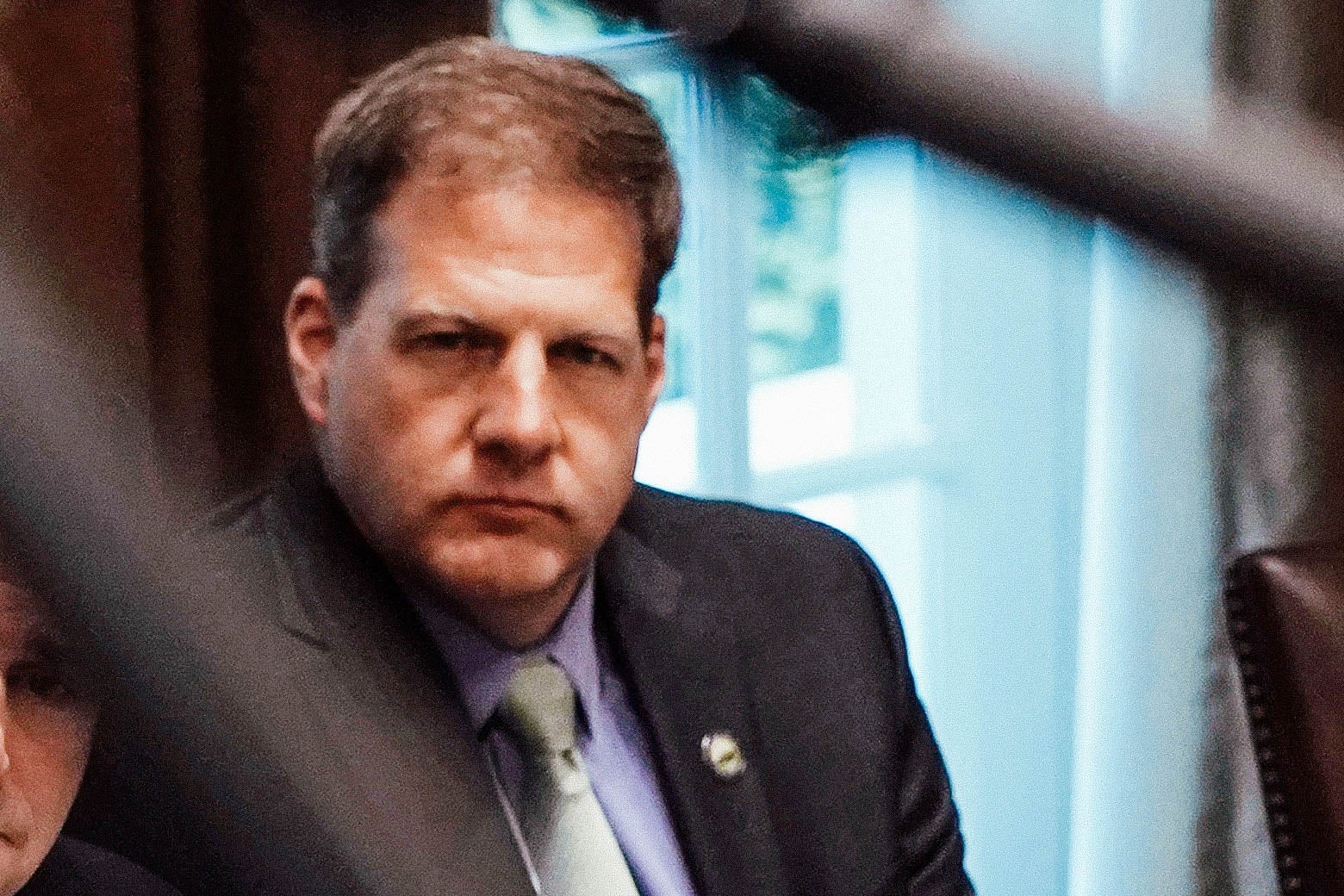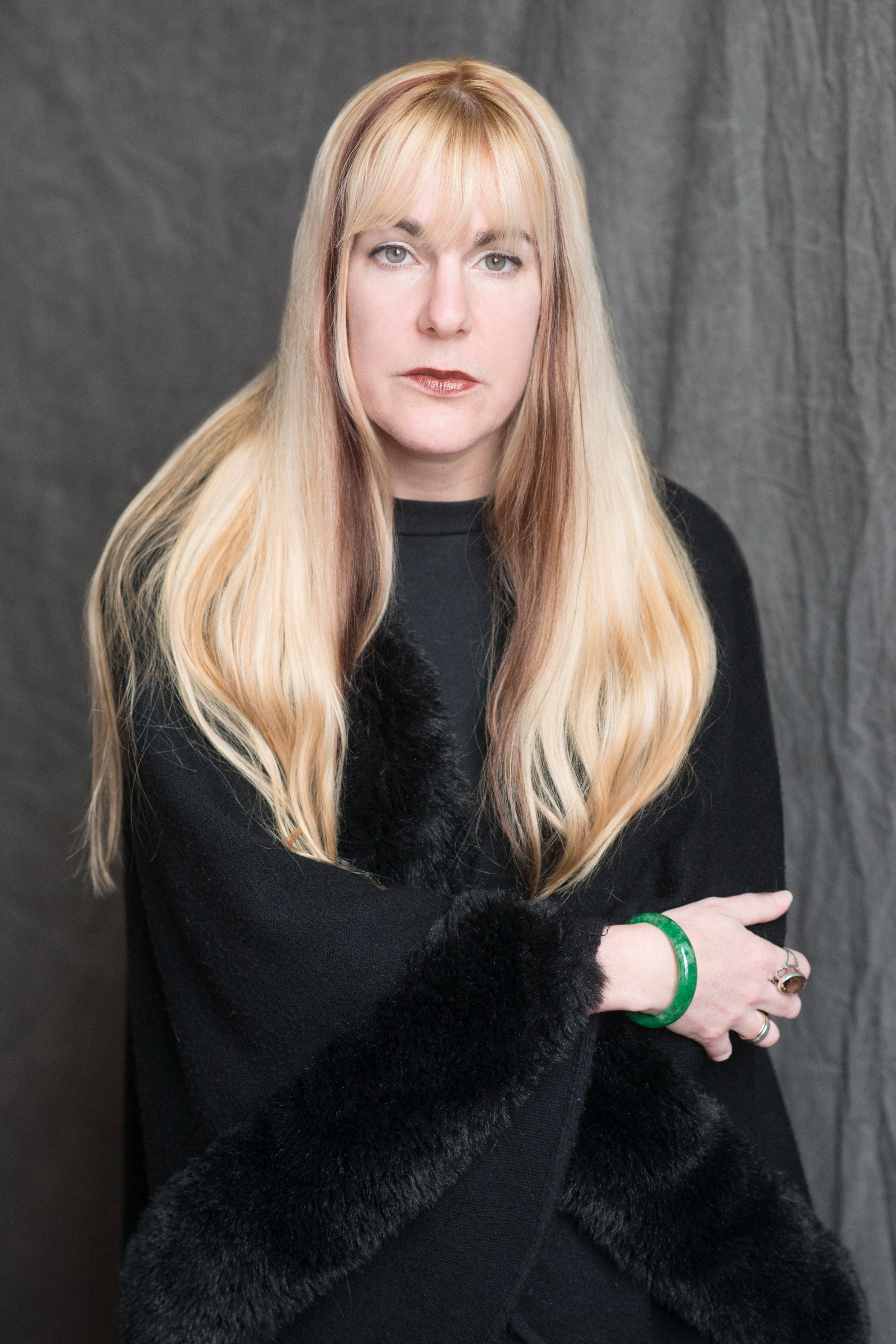In his poem “New Hampshire,” Robert Frost once called his home “a most restful state.” But these days, New Hampshire’s tightknit poetry community is anything but restful. “I don’t want to pussyfoot anymore,” said Marie Harris, a former state poet laureate. “We tried our best not to be confrontational, and not to splash it all over the news, but the time has come.” At issue is a controversial nominee for state laureate, private negotiations with a governor who says he’s “not a poetry expert,” and a bit of verse that an elected official described to me as “a misogynistic poem about sex with Condoleezza Rice on Air Force One.”
As described in a 1967 state statute, the selection process for poet laureate is supposed to work like this: A nonprofit organization called the Poetry Society of New Hampshire evaluates nominations for the position and then makes a recommendation to the governor. The governor takes the nomination to the state’s five-person executive council and then formally makes the appointment. The five-year position comes with a $500 annual stipend from the Poetry Society and the honor of joining a distinguished list of New Hampshire state poet laureates that has included nationally known writers like Donald Hall, Maxine Kumin, and Jane Kenyon.
This year, however, the governor has “totally dissed the committee,” said the Poetry Society’s president, Don Kimball. The Poetry Society’s selection, made last fall after months of reading and consultation, was Jennifer Militello, a widely published poet and founder of the New Hampshire Poetry Festival. Militello’s 2013 collection, Body Thesaurus, was named one of the best books of the year by the Best American Poetry series, and her work has received several high-profile prizes. (Her “memoir in essays” will be published by Dzanc Books next month.)
The governor, Republican Chris Sununu, had other plans, the New Hampshire Union Leader reported this spring.* His pick for the position is Daniel Thomas Moran, a retired dentist and former poet laureate of Suffolk County, New York. Moran did not make the Poetry Society’s short list, and several members of the selection community said he is not well-known within the poetry community either locally or nationally. Several of Moran’s multiple volumes of poetry were self-published. “It’s like passing over a Masters champion for the community miniature golf winner,” said Harris, a member of the selection committee. She said the process “has the potential to be very embarrassing for the state.”
Several insiders mentioned one particular poem of Moran’s as being unbecoming of the office: “White on Rice,” in which the poem’s narrator expresses his desire to have sex with former Secretary of State Condoleezza Rice. The New York Times printed an excerpt of that poem in 2007, in a story about a dustup over the appointment of the poet laureate of Suffolk County, New York, with which Moran was also entangled.
Condoleeza are we
not the lucky ones,
Happier than a
barrel of nuns.
Like impetuous kids
we would have our fun
In the lavatory
on Air Force One.
“White on Rice” appears in The Book of Moran, a 2007 collection published by Asinine Poetry, whose website says it is devoted to “mostly kinda funny” poetry. Asinine’s website features more than 40 of Moran’s poems, including “A Sonnet for Our Lesbians in Orbit,” “An Ode to Dame Edna,” and “The Girls of Vancouver 2010,” a tribute to female Olympians that ends with the quatrain “Those female lugers luge-ing down the track,/ Can make my heartbeats nearly seize./ But if you want to light my Olympic torch,/ Give me chicks with guns on skis.”
“He’s certainly entitled to publish poems of that nature, but it’s not in keeping with Donald Hall and Jane Kenyon and the other substantial poets who have served as poet laureate for our state,” said Andru Volinsky, a Democratic member of the five-person executive council that would have to approve the governor’s nominee. “I did not feel comfortable supporting someone who wrote a poem like ‘White on Rice.’ ” The executive council currently includes three Democrats and two Republicans, and Volinsky said that on the laureate issue it remains split along party lines. (Moran did not respond to several requests for comment. When I called him at home after sending him messages via email and Facebook, a woman picked up the phone, said, “Please don’t call our home. He did get your message,” and hung up.)
Sununu’s attachment to Moran is confounding to critics. The two men are not close friends, as far as anyone knows, and they don’t appear to be political allies. (Moran’s most recent tweet was in support of Kamala Harris.) But Moran and the governor’s wife, Valerie Sununu, serve together on the board of the New Hampshire Humanities Council, and Moran read an original poem and posed for a photo with the governor at Sununu’s second inauguration in January. (At Sununu’s first inauguration, a local arm-wrestling champion read a poem. A later investigation found that Sununu’s inaugural committee paid her and an associated entity $2,500.) Harris said that Sununu described Moran to the committee as a “nice guy.”

For the Poetry Society, that is not enough. “It would have saved us an awful lot of time, those hundreds of hours of work, if our criteria was ‘Is this person a nice guy?’ ” Harris said. “We were shocked,” Kimball said. “It’s the first time the governor of the state of New Hampshire has totally circumvented the selection process and unilaterally made his own decision.”
By now, the process has dragged on for almost a year. The Poetry Society first submitted Militello’s name to the governor’s office last fall, and then resubmitted it in January upon request. Kimball said the Society heard nothing until it found out from a third party that Sununu planned to submit Moran’s name instead. Kimball said he wanted to give the governor a chance to “save face” and reverse course, so he instructed his members not to post about the conflict on Facebook. Instead, they discussed their options in late-night phone calls, wondering what to do next. A new poet laureate was supposed to be named in March, but that deadline passed.
After months of limbo, the Society arranged a meeting with Sununu on June 5. But three members of the selection committee describe Sununu’s demeanor in that meeting as dismissive and defiant. Harris recalls him saying words to the effect of “I’m the governor, and I can do what I want.” Kimball described his approach as “dictatorial.” “That’s typical of this governor,” said Volinsky, the executive councilor, who was not in the meeting. “He doesn’t reach out or attempt to collaborate.” Volinsky pointed to the council’s recent rejection of Sununu’s nomination for state Supreme Court chief justice, which the governor responded to by announcing he would “pause” all other judicial nominations. “It’s kind of a pattern with the governor that if he doesn’t get his way, he takes his ball and goes home,” Volinsky said.
Nationally, conflicts over state poet laureate positions are rare, but they can be nasty. A conflict strangely similar to New Hampshire’s erupted in North Carolina in 2014, when Gov. Pat McCrory bypassed the state’s Arts Council and appointed a self-published poet to the position. After an uproar, she resigned after less than a week. In 2002, New Jersey Gov. Jim McGreevey removed prominent poet Amiri Baraka from his position after Baraka read a controversial poem on the anniversary of Sept. 11, 2001.

For now, it’s not clear how the New Hampshire standoff will end. After the June 5 meeting, the governor’s office again went silent on the matter, and members of the Poetry Society are increasingly frustrated. Several committee members also expressed surprise that Moran has not stepped aside, given that, as Alice Fogel, the state’s current poet laureate and a member of the selection committee put it, “no one in the literary community supports him.”
Sununu’s office and the Poetry Society agree that it’s Sununu’s prerogative to nominate his own candidate, as long as he first solicits input from the Poetry Society, which he did. But the poets are troubled by Sununu’s circumvention of tradition to promote a candidate whom they see as clearly underqualified, and who seems to have been chosen on a personal whim. “It’s a blemish on the respect of the community of writers in New Hampshire,” Fogel said. “It’s something we’re really troubled by, to have someone represent our state who we don’t stand behind.”
Militello, the Society’s pick, declined to answer questions, but said in a brief statement that she is “extremely honored” to have had her name put forward. “The Laureateship selection process is not about any individual poet, as the position itself exists to insure a vibrant future for poetry in New Hampshire.”
For now, neither side seems willing to budge. Fogel remains in the position for now. Sununu’s communications director, Ben Vihstadt, said Moran remains the governor’s nominee. The Poetry Society says it will not consider switching its support to Moran from Militello. One possibility is that the governor does nothing, and the state eventually has no poet laureate at all.
Frost’s poem “New Hampshire,” written in 1923, acknowledged the state’s outsize reputation as a literary hub—and suggests, perhaps, the small comfort that even if New Hampshire goes without a poet laureate, it won’t be short of poetry. “Do you know,” Frost wrote of the state, “there are more poems produced than any other thing?”
Update, July 19, 2019, 11:53 a.m.: This piece has been updated to acknowledge the New Hampshire Union Leader’s original reporting.
